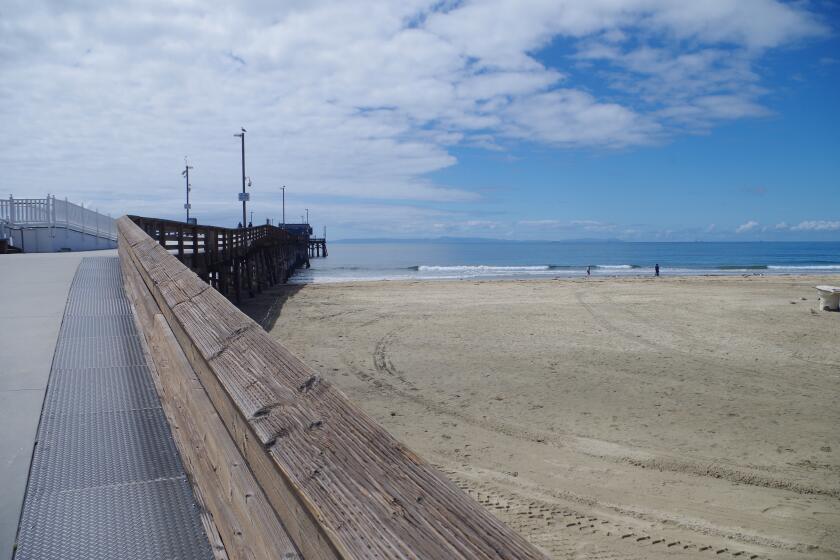Centennial Farm docents plant seeds of learning for O.C. fairground visitors
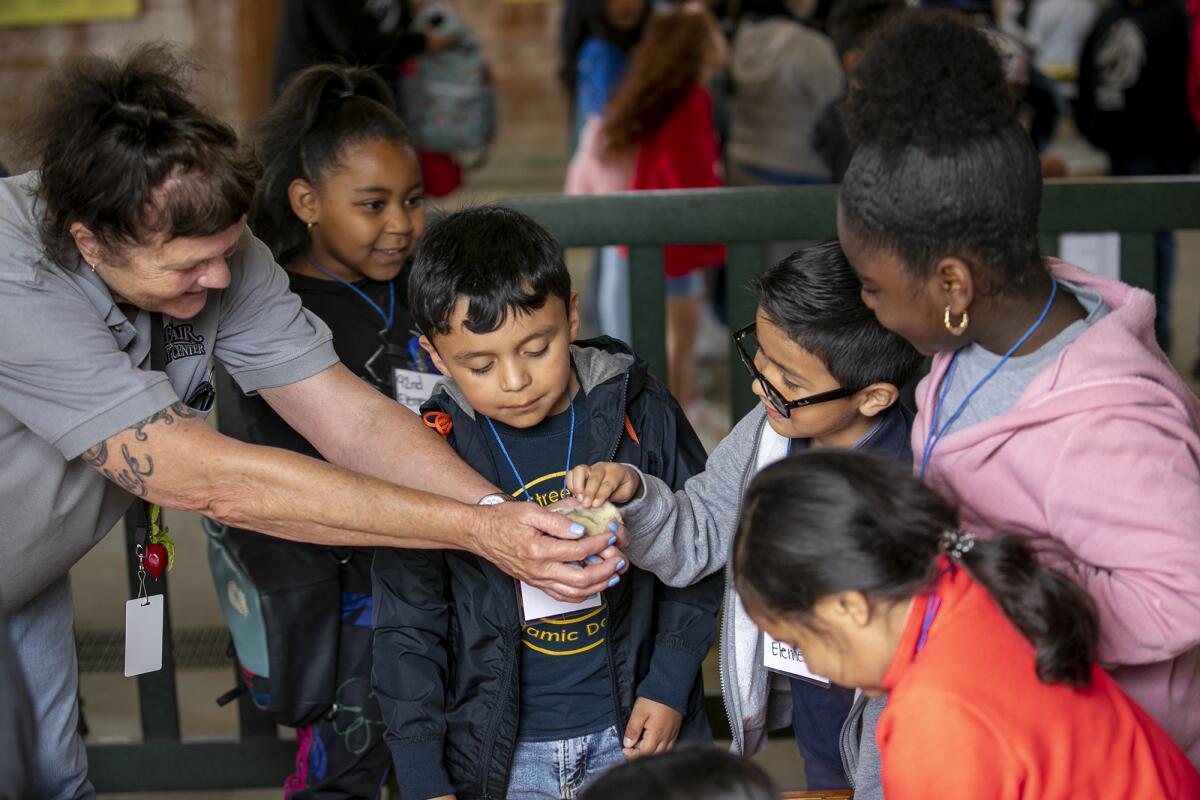
- Share via
Days at Centennial Farm can get pretty quiet during a typical week, when small groups of children and their caretakers dot the landscape of the year-round working farm situated at the southern end of Costa Mesa’s O.C. fairgrounds.
The scene during the site’s Discovery Days, however, which take place once or twice a month when the Orange County Fair is not occupying the space, are quite a different scene. Equal parts education, entertainment and play, the farm pulls out all the stops, offering a full lineup of free activities, exhibits and tours.
And on Thursday — the last Discovery Day to be held before Centennial Farm closes to prepare for the annual extravaganza and, for some, the beginning of summer break — the excitement was palpable.
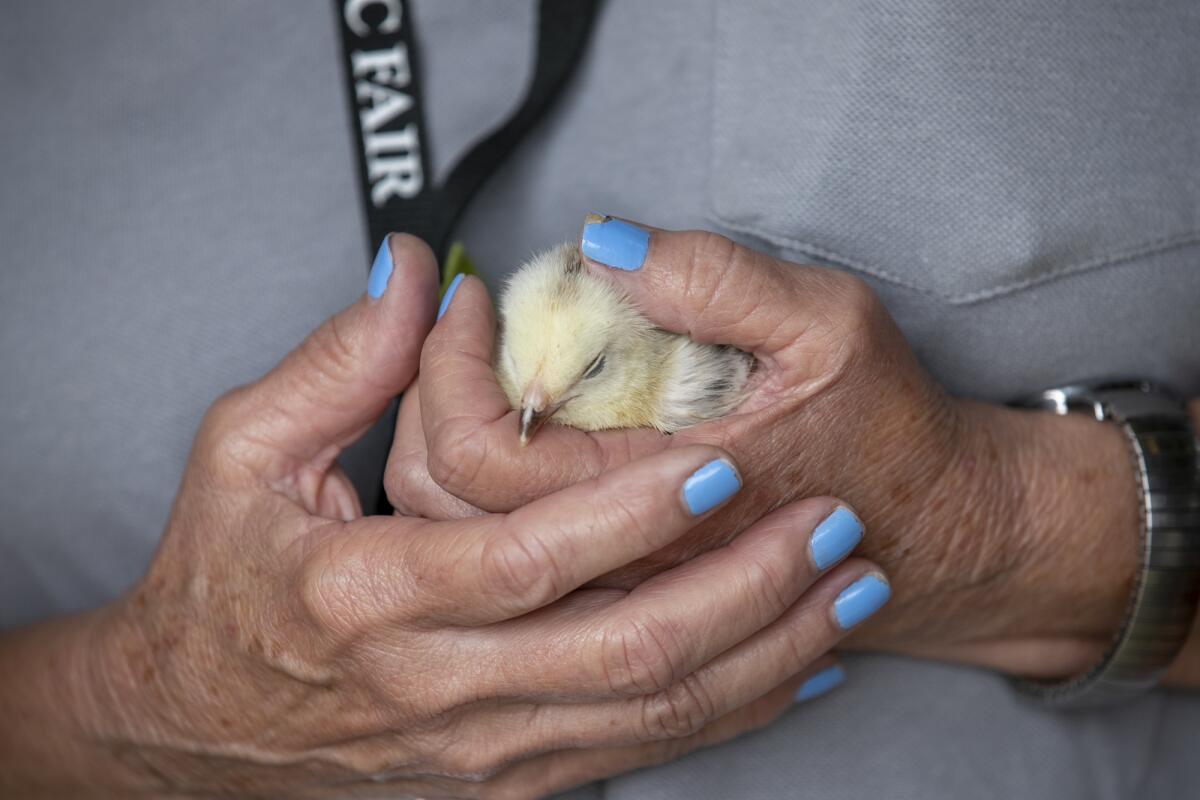
Clamorous groups of schoolchildren bearing construction paper headbands with their names written in magic marker planted radish seeds and mingled among small groups of preschool children walking through the garden in matching T-shirts and home-school moms with sons and daughters.
Providing a calm presence amid the melee of 1,100 kids, parents and school group leaders were about a dozen Centennial Farm volunteer docents who, posted at various stations throughout the grounds, happily provided fun facts and context that make Discovery Days much more than mere play.
“Every corner of this farm has a volunteer today,” said Centennial Farm Supervisor Allen Mesick, who oversees a team of 90 people, many of them local retirees. “I’ve been here five months and, hands down, the volunteers are the heartbeat of the agricultural programs we do here.”
All it takes is a quick look around the 3-acre working farm to see how right he is.
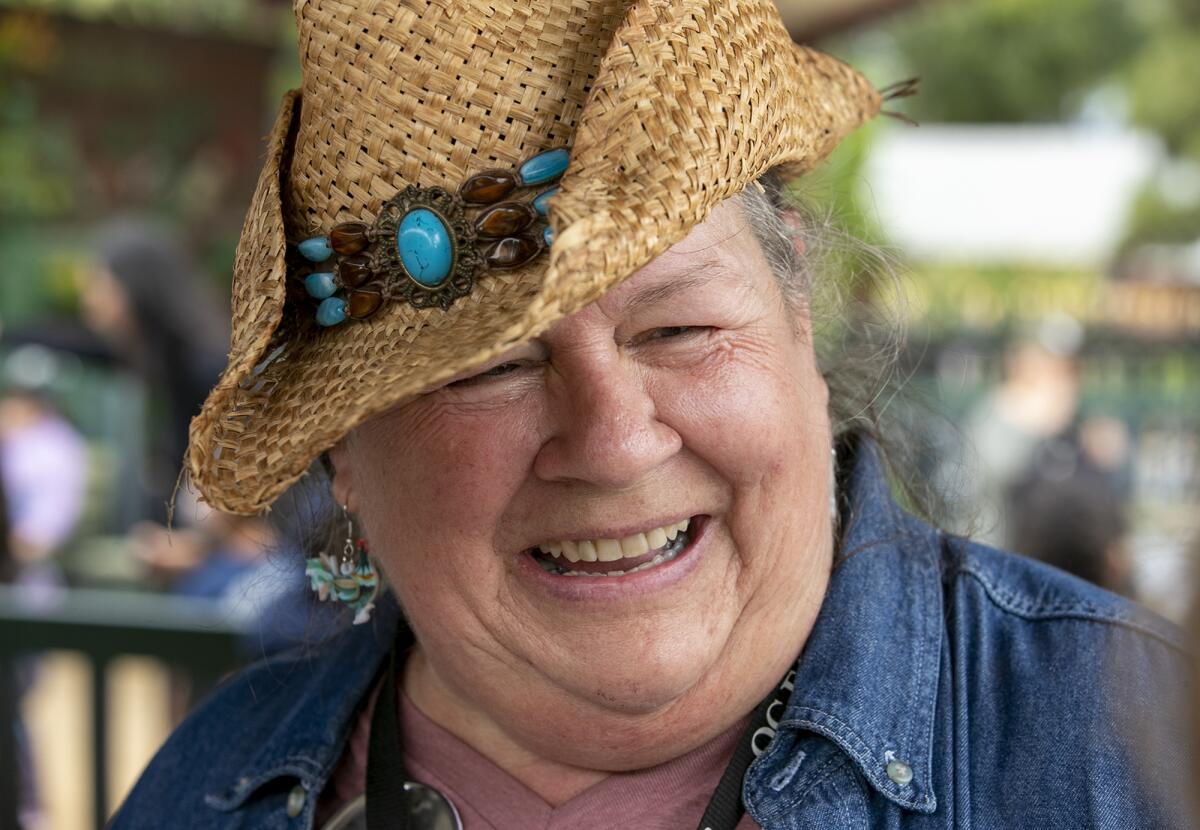
Near the site’s Millennium Barn, 76-year-old volunteer Robin Alward is stationed near two 2,400-pound oxen, Howie and Hoss. She explains to youngsters an ox is simply a cow or bull that has taken up the yoke and been put to work.
Alward came to Centennial Farm 15 years ago after retiring from UC Irvine, where she worked as an academic counselor. Although she is visually impaired and has to take a 90-minute bus ride to Costa Mesa from her home in Seal Beach twice a week and four times during the fair, it’s worth the trip.
“When the fair came I’d be the first one to come out. And when I came [to the Centennial Farm], this was the first place I came,” she said. “So when I retired, I came here.”
By now, the tutorial she delivers to children as she introduces them to Howie and Hoss has become second nature. The American Milking Devon bulls came from a ranch in Colorado. Their breed was brought from Devonshire, England to the Plymouth Colony in 1623 and was George Washington’s favorite cow.
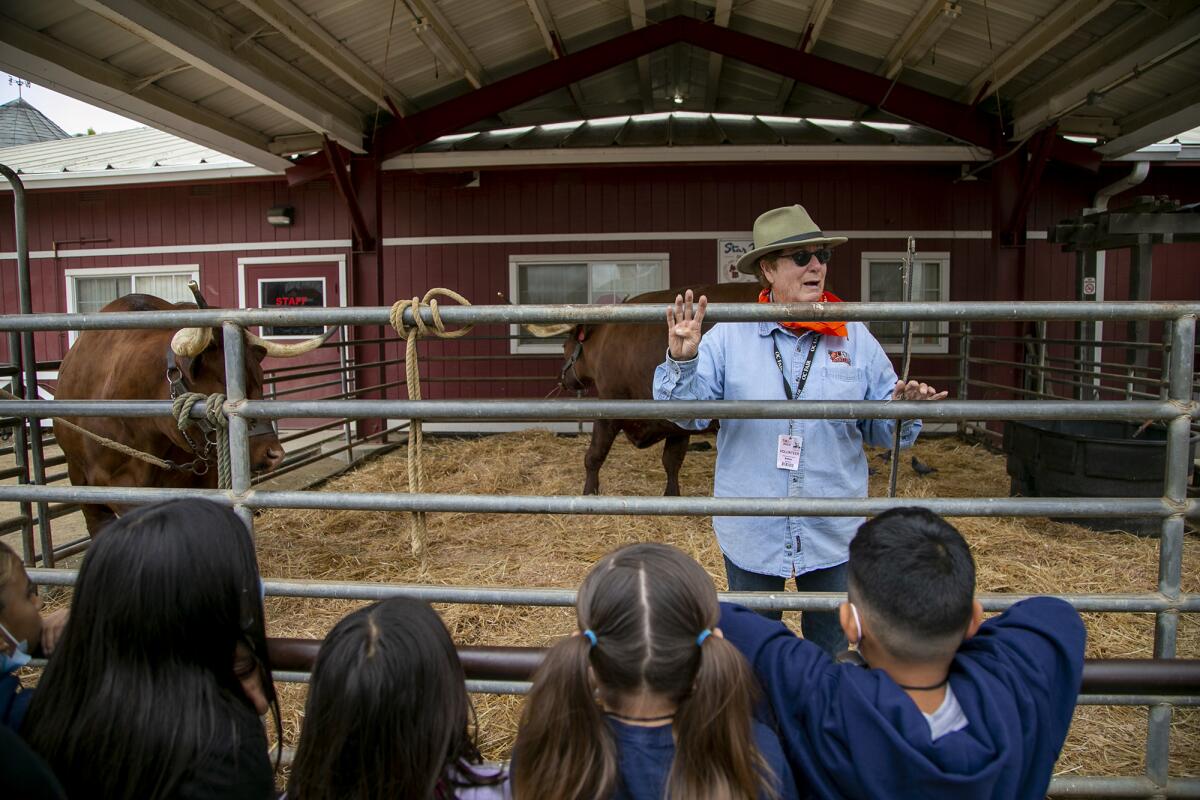
When children inquire about their age or how much they weigh, Alward easily dispatches information (10 years old, 2,400 pounds). She said she loves sharing her knowledge with other people as much as simply being around the silent behemoths.
“I’m an academic. I need balance, and I really like animals,” said Alward, who’s also a docent at Santa Ana’s Bowers Museum. “They’re real, there’s no false front, they’re in the moment. I just want to be in that moment with them.”
Carol Bills, 76, of Westminster, is a food ingredient broker who owns her own business. But when business began winding down after the pandemic, she found herself looking for something to do. Centennial Farm seemed like a perfect fit.
“I’m an animal addict, but I can’t volunteer at shelters because everything would come home with me,” she said.
“hands down, the volunteers are the heartbeat of the agricultural programs we do here.”
— Centennial Farm Supervisor Allen Mesick
Soon after she reached out to Mesick, Bills was learning the ins and outs of farm life and all that she would have to know to be a docent. Armed with a plant and animal guide, she had to pass a written test and shadow others before being entrusted with her own tour.
Education is a key component of Centennial Farm, particularly during the widely attended OC Fair and Discovery Days, according to Mesick.
“Kids get to learn eggs don’t come from the refrigerator and where their food and fiber come from. For many, this is their first exposure to agriculture,” he said. “[Our volunteers] didn’t necessarily grow up on a farm. So we teach them everything they need to know, then we pair them with seasoned volunteers so they can get a hands-on practical education.”
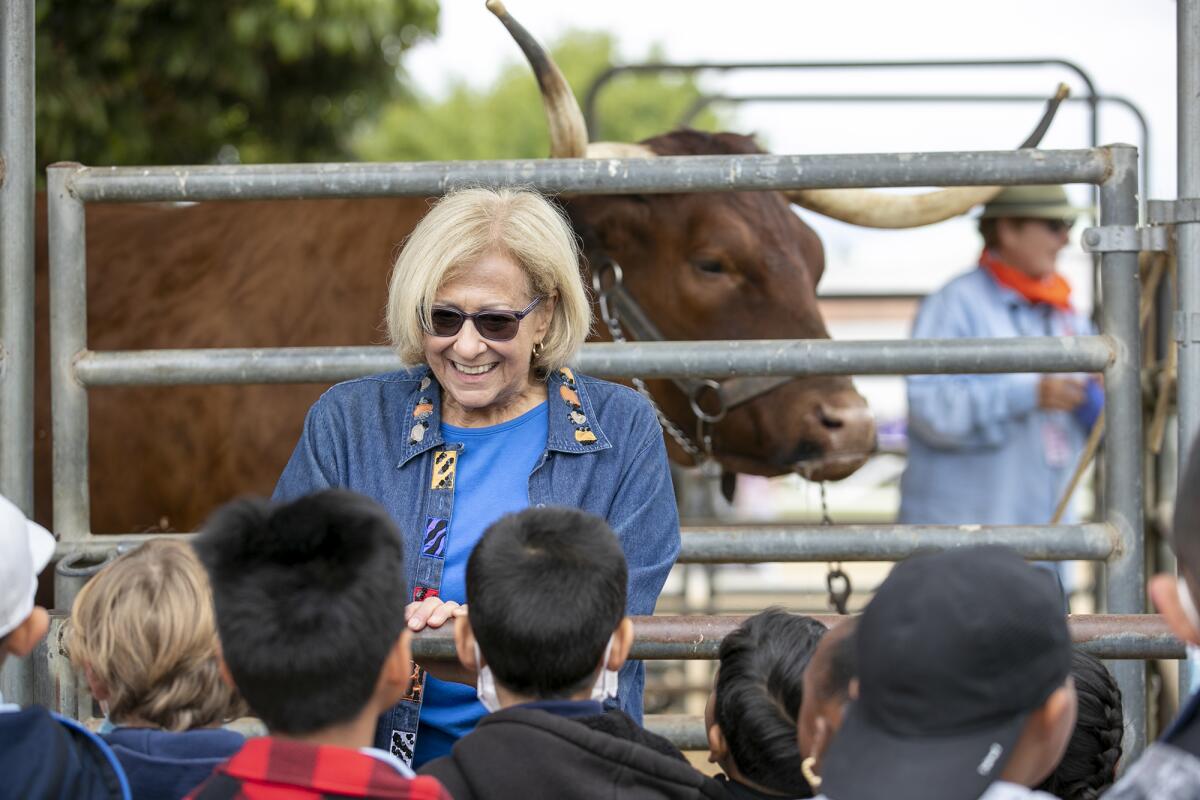
Thursday found newcomer Bills working with Alward and the oxen.
“There’s so much to know — I need to get my feet wet by just doing this,” she said, and when Alward had to step away momentarily and a group of school children came to see the massive bovines, that’s exactly what she did.
Inside the Millenium Barn, children watched cow-milking demonstrations and learned about the development of chickens, from the egg to tiny fluff balls to full-grown adults. As a treat, they got to see baby chicks and pet them.
Nearby, longtime volunteer Cheri Wall manned the touch table, which encourages kids to hold, touch and smell various varieties of vegetables, flowers and crop plants. Kids and their parents were surprised to learn a loofah is not a sea sponge, but the dried interior of a gourd.
The 78-year-old Fountain Valley resident has volunteered at the farm for the past 20 years, since her husband urged her to consider the activity.
“[He] said, we’re going to go to a luncheon, it’s about giving tours to kindergartners and first-graders,” she recalled. “I said, ‘not for me’ — and here I am.”
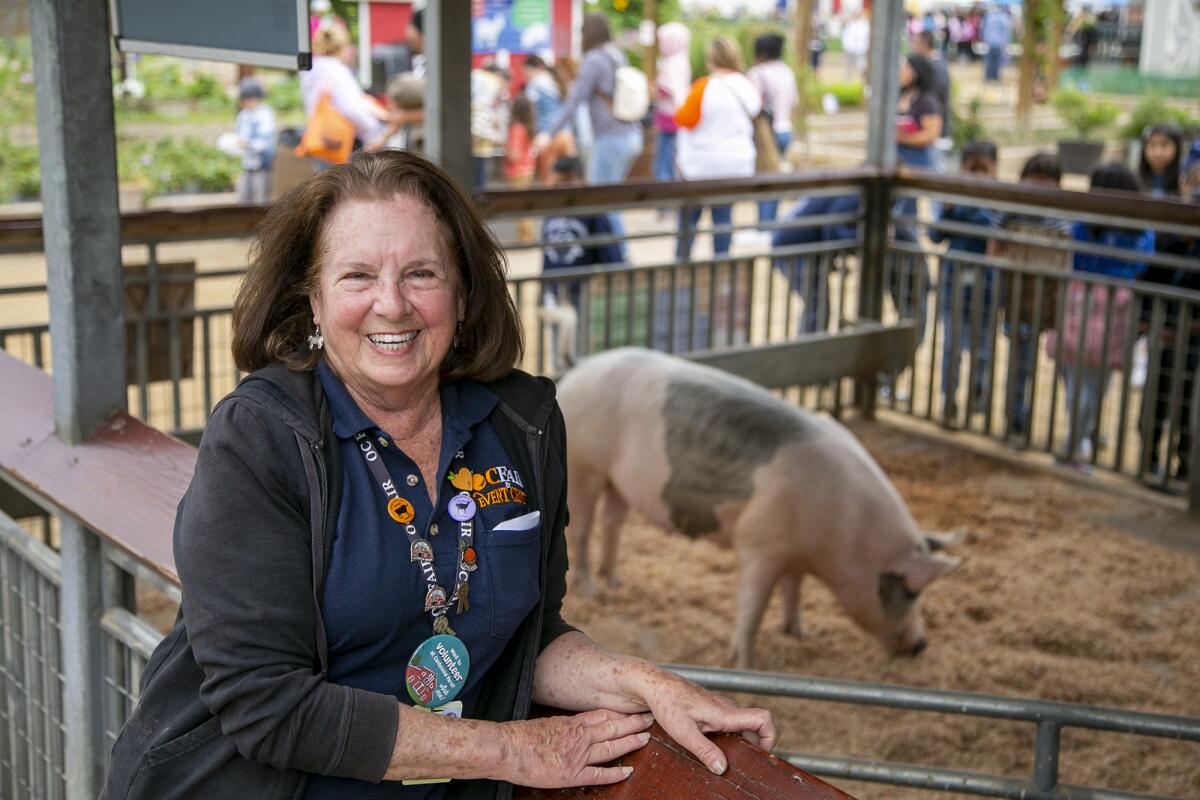
Among one of the longest-serving volunteers is Barbara Livingston, a Huntington Beach resident who came to Centennial Farm 27 years ago when her daughter entered the first grade.
“I was looking for something to do but didn’t want a full-time job, and I like animals and plants,” she recalled, two small silver cow pendants dangling from each ear. “I’ve been here ever since — they can’t get rid of me.”
On Thursday, she corralled the interest of kids at the pig pens, where two pregnant sows are prepping for summer deliveries. Before that, she’d served an hour with the angora goats, and in a few minutes, would head off to another station.
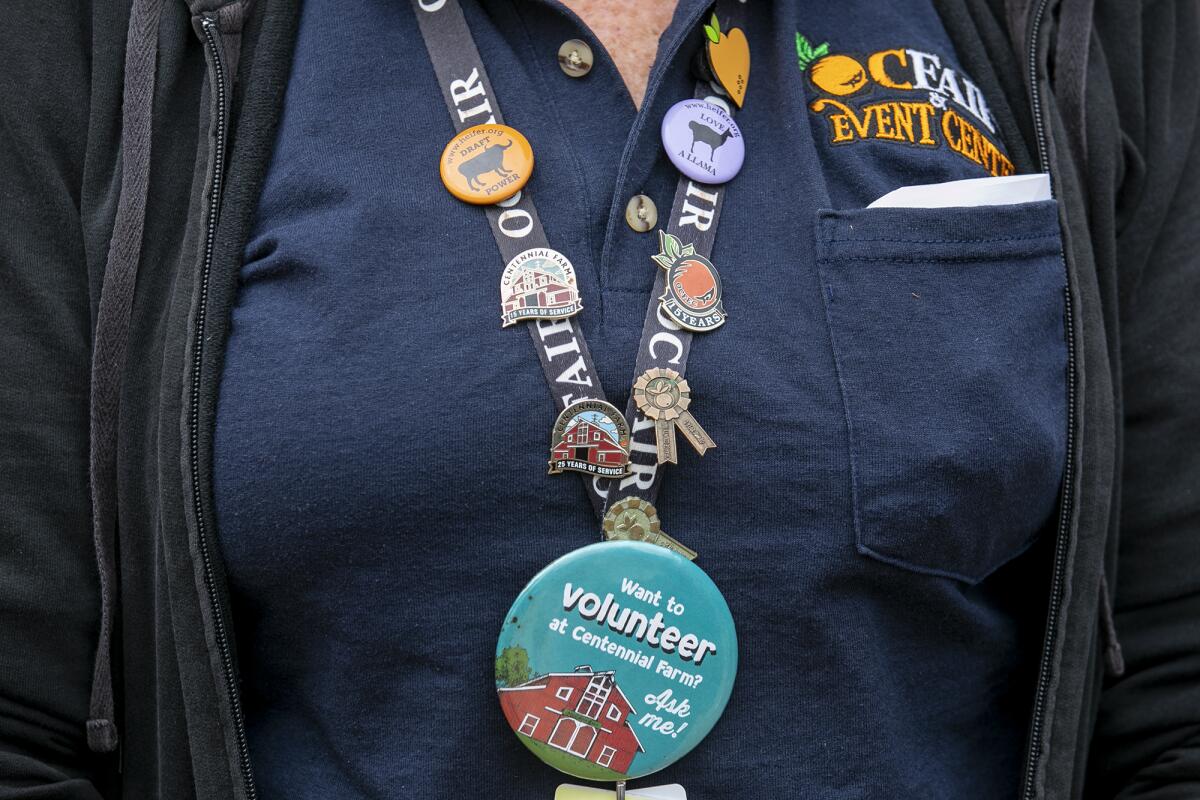
“We couldn’t do this without Barb,” Mesick said. “We always put new docents with her, because she knows how to do everything.”
The hard work put in by volunteers is not lost on the visitors themselves.
Santa Ana mom Isabel Tavares, who came out with 10-year-old daughter Isabella, son Ezekiel, 7, and another homeschool mom and her children, said she was surprised at all she’d learned that day, like how honey never goes bad and was used as an antiseptic in World War II.
Isabella and friend Timber Ramirez, 9, were mostly impressed by the animals they got to see, touch and learn about, from baby goats to chicks to the farm’s guard dog.
“I saw some pretty exciting things and I got to pet some really cool animals, especially babies,” Isabella said. “We smelled a rose that smelled like aloe vera.”
“I’ve been here before, but this was really special,” Timber agreed. “I like that all the crops here are starting to have fruit.”
Lake Forest resident Andrea Le, who was purchasing honey stix from an Orange County Beekeepers Assn. booth, brought 3-year-old daughter Kaya and 6-year-old son Henry along with baby Emmy.
Le credited the docents for teaching her a few things, too.
“The seed lady was super enthusiastic and really got the kids involved. And the lady with the chicks taught us all about the life cycle of the chicken and how eggs hatched,” she said. “Honestly, we learned lots — it was great.”
All the latest on Orange County from Orange County.
Get our free TimesOC newsletter.
You may occasionally receive promotional content from the Daily Pilot.

